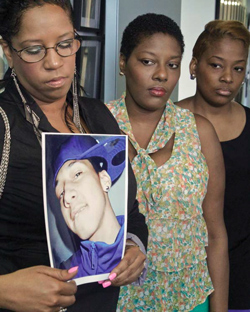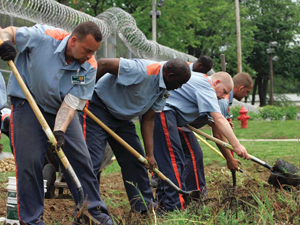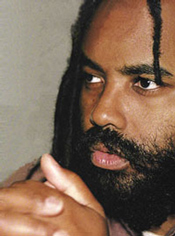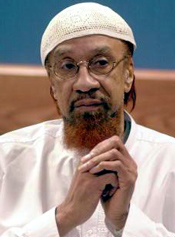Advocates push for access to inmates and ability to scrutinize institutions

Charnel Robinson holds a picture of her son Christopher, while standing with his aunts Charntae Robinson, center, and Chardel Lauchner, right, June 8 in New York. The city has agreed to pay $2 million to Charnel Robinson for the killing of her son at the Rikers Island jail by a cartel of inmates who sometimes acted as enforcers for corrupt prison guards. Photo: AP Wide World Photos
|
Problems range from depriving inmates of religious literature and denying religious practices to denial of medications and treatment as well as serious and possibly deadly beatings. Another issue cited is the use of dehumanizing isolations units, which keep inmates locked down for 24 hours a day with no human contact.
These conditions and billions of dollars spent by corrections institutions demand greater transparency and accountability, advocates say. California activists are backing legislation which would shine light on one of the largest prison systems in the country and end what they call a media lockout.“Everything is we have to be tough on crime and tough on drugs and we have to be tough on kids and be tough on that, to the point where we’re no longer being tough. We’re just being stupid!” declared Ed Yohnka, spokesperson for the ACLU of Illinois.

Inmates harvest potatoes at Southeastern Correctional Institution Tuesday, Aug. 4, 2009 in Lancaster, Ohio. Overtaxed food banks and underfunded governments are turning increasingly to prisoners for free labor to feed the hungry. Photo:AP/Wide World Photos
|
Prior to 1996, media was allowed into California prisons but an emergency internal regulation change ended access. Since then no reviews have been held or changes made, activists complain.
That means inmates face almost overwhelming odds to expose problems and protests, such as hunger strikes, and charges of torture and hellish solitary confinement, said Ms. McGill.
People need to see what overcrowding does and how bad conditions are, she added.
But the corrections department’s $10 billion prison budget, which has little transparency, is a major cause for someone from the outside to look into what is going on, the advocate argued.
“So the third largest portion of the (state) budget has no ability for taxpayers to monitor what happens to their money?” said Ms. McGill.
Taxpayers are funding prisons through sales and payroll taxes and should know what is going on, she continued. State budget woes are forcing renewed dialogue about prisons, money and resources spent on minor offenses.
With HIV spreading in prisons and other epidemics, family members and the society at large need to know what is happening, Ms. McGill said.
The state legislation, AB170, passed the Senate Public Committee and is heading to the Senate Appropriations Committee. If the bill clears Appropriations, it heads to the Senate floor and then Gov. Jerry Brown’s desk for signature.
Noelle Harahan, director of Prison Radio, which produces pieces from inmates by going into prisons and via phone, says a media blackout was used to help facilitate the explosion of incarceration inside America.
For the prison population to grow as it has, the voices of inmates had to be shut out so the public would go along with the propaganda of the political and ruling elite, she said.

Mumia Abu-Jamal
|
Attacking the First Amendment rights of inmates of the last 30 years meant inmates were deprived of the “ability to educate themselves and to educate us. It had to happen for the state to get what they wanted, and to suppress opposition to mass incarceration and how they were going after communities,” she said.
Many states block inmate access to the outside world and with the complicity of mass media, these stories have been buried, she continued. The few courageous journalists were censored and telling these stories ends careers and shuts off opportunities, she added. But, Ms. Harahan said, with these stories told the public could have made better decisions about public policy—such as education versus public spending.
There is also no way to keep problems behind the walls, people come home and help create the culture of communities, she said. Just look at the negative impact of not having Black men around, Ms. Harahan said.
“We can’t be deluded that we’re separate,” Ms. Harahan added.
Once her group helped make Mr. Abu Jamal’s story public in Pennsylvania, the state banned in-person interviews with any inmate, Ms. Harahan recalled. The ban was really felt beginning in 1996 and 14 states quickly instituted the same rule, she said.
So reporters were denied access to inmates and inmates were moved to keep them away from reporters, Ms. Harahan explained.
There are still ways to find and get the stories but institutions make it hard and there are negative consequences for inmates and journalists, she added.
Jimmy Thompson spent 22 years in prison and knows firsthand what transparency would mean for the men who prayed for his freedom and were left behind.
He is backing AB1270 as executive director of the Fair Chance Project, which works to free inmates denied parole long after their terms have been satisfied.
Prison officials want to keep the public out as much as possible to continue business as usual, which is to continue overcrowding dormitories and improperly feeding inmates, he said.
A typical breakfast can be a handful of prunes and French toast, “to two pieces of bread stuck in batter, burned and thrown on your plate. Inmates received a small carton of milk and on the way out, a bag lunch for those headed to work. The sacks included a small tube of peanut butter, maybe a packet of jelly and a packet of what inmates called bug juice,” he said.
“They went from bad to worse. Anytime they talk about the budget they take away from the inmates. ... Before I left I heard conditions had changed a little but at Solano Prison we had some 420 inmates living in a dorm designed for 164,” Mr. Thompson told The Final Call.
Dorms had 12 toilets for inmates and had no toilet tissue or paper towels, he added.
The perceptions inmates live well with three hot meals day, clean linen, recreation and watch TV, are lies, he said.
Grassroots activists and advocates also warn changing the way prisoners are treated isn’t simply do-gooding, most of the one million people in local, state and federal institutions are coming home.
The angrier and the more abused they are, the worse it is for the country, neighborhoods and communities.
There is also a trend of institutions to follow one another with policy and if California can change, it could spark other corrections officials to change or other activists to organize.
“We have people who clearly shouldn’t be incarcerated. We don’t really give any care, treatment or skills to people once they’re incarcerated so it just exacerbates problems for people who have learning disabilities or are mentally ill, and many of those people end up being disciplined by this over use of solitary confinement, which has these horrendous impacts,” commented Ed Yohnka, of the ACLU of Illinois.
He spoke specifically of policies at the Tamms Correctional Center in Illinois, which he said are being duplicated across the country.
Inmates are held 23 hours a day in solitary confinement with no human interaction, prompting a federal judge to note long lasting psychological and emotional harm.
Gov. Pat Quinn proposed closing Tamms to cut costs, which are three times more higher than other state facilities, Mr. Yohnka noted. But predictably, political leaders fought the closure, citing job protection and scary rhetoric like “keeping the worst of the worst off the streets.”
A Senate Judiciary Committee was poised to hold a hearing June 19 as The Final Call went to press on the impact and overuse of solitary confinement.
On May 31, the Center for Constitutional Rights filed a federal class-action lawsuit on behalf of inmates held in solitary confinement from between 10-28 years in the Pelican Bay State Prison’s Security Housing Units (SHUs).
According to Solitary Watch, a website dedicated to raising awareness about solitary confinement and other forms of torture in the U.S., at least 80,000 U.S. prisoners are in some form of isolated confinement, including approximately 25,000 in Supermax prisons.
According to Ruiz v. Brown, the lawsuit stemming from the July 2011 Pelican Bay SHU Hunger Strike, human costs are inhumane and debilitating, said the anti-prison group Critical Resistance.
According to the suit, the California Corrections Department reported more than 500 prisoners, about half of the population at the Pelican Bay SHU, have been in solitary confinement for more than 10 years. Seventy-eight of those have been in solitary confinement for more than 20 years.
They are cramped in concrete, windowless cells for 22 and a half to 24 hours a day, denied phone calls, contact visits, and vocational, recreational, or educational programming.
In California, inmates can be put in solitary confinement merely based on alleged association with prison gangs.
But the media lockout is not just for so-called criminals, there are voices purposely shut out, say advocates and journalists. Guards make it very difficult by threatening prisoners, yanking phones out of the walls, transferring prisons who tell stories about abuses and keeping journalists off approved phone lists, noted Ms. Harahan. There are “real dungeons in the United States,” she said.
“There are people we should be able to hear from that the state is preventing us from hearing from for political reasons because they don’t like what they say,” said Ms. Harahan, whose website is http://www.prisonradio.org/, and an additional site http://www.mumia-themovie.com/.
In Colorado, Imam Jamil Al-Amin, formerly known as H. Rap Brown, is in a Supermax prison, 1,400 miles away from his Atlanta community, and supporters say he is a political prisoner.

Jamil Al Amin
|
Imam Al-Amin was convicted in the 2000 shooting of two Fulton County deputies, one died, in Atlanta. But Georgia handed him over to the federal government. He is serving life in federal prison without a federal charge, sentence or conviction, his wife Karima Al-Amin, an attorney, told The Final Call. He was moved without his family’s or attorneys’ knowledge. Supporters are gathering signatures to have him moved back to Georgia.
The last time Mrs. Al-Amin visited her husband was mid-May. His visits occur behind glass. He receives two phone calls per month, each for 15 minutes. He’s allowed five social visits per month by telephone but absolutely no contact. When he’s in the legal room, they can pass notes through a very small slit, but he is handcuffed for the entire visit at his waist. His recreation is alone in what some would consider a dog pen to walk around in.
“By the time we leave his wrists are swollen. It’s absolutely inhumane, even for them to have him handcuffed in a room with a little slit that you can get a few pieces of paper through. Even though they may bring food in for him to eat, he can’t even eat handcuffed to the waist,” Mrs. Al-Amin, an attorney, continued.
The Nation of Islam has a proven track record of a transformative work among prison inmates. Perhaps the most well-known example of the power of the redemptive teachings of Islam as taught by the Honorable Elijah Muhammad behind bars is Malcolm X.
Today there are continuous efforts to thwart inmates’ access to the Nation’s newspaper, The Final Call, and DVDs and materials by the Honorable Minister Louis Farrakhan are ongoing.
Dr. Ava Muhammad, attorney and national counsel for the Nation of Islam, has been actively involved in efforts to make sure inmate access to the newspaper is not restricted or banned.
In 2005 prison officials in Louisiana instituted a statewide ban on The Final Call citing what was deemed “objectionable material,” contained in the Muslim Program, published on the inside back page of the newspaper.
“The fear on the part of these law enforcement agencies, their representatives and correctional facilities is the opposite of what they say it is. Their fear is that Black men and women will convert to Islam while they are imprisoned as did Malcolm X and they don’t want that type of result to take place again,” said Dr. Muhammad.
The case filed by the American Civil Liberties Union on behalf of Henry Leonard, a member of the Nation of Islam incarcerated in Louisiana’s David Wade Correctional Center, was won successfully on the district court level and appellate level in the U.S. 5th Circuit Court. The state asked for the case to be argued in front of the U.S. Supreme Court.
“Even as we speak, we are all waiting to see whether or not the U.S. Supreme Court will hear the case. But there is a general problem coast to coast and the danger and difficulty is that many of the inmates who are in state correctional facilities are subject to the arbitrary decisions of local correctional officials,” said Dr. Muhammad, who also serves as national spokesperson for Min. Farrakhan.
In federal institutions the same problem exists, she said.
U.S. courts ruled decades ago that the Nation of Islam is a religion; but the movement is still characterized and categorized as a separatist hate group. This mischaracterization is often used to justify banning Nation religious materials to men and women in prison.
Dr. Muhammad said it is important for reporters to have access to inmates because of the public need to know what is happening in prisons, especially given high numbers of incarcerated Black men. According to the Justice Department, 1.6 million people were locked away in federal and state prisons in 2010. Over half million are Black men; just under 400,000 are Latino and about 30,000 are Black women and just under 19,000 are Latino women.
“Media attention is essential first of all just on bringing it into our consciousness that they are there. Because the mere fact they are there is a crisis, even if they were being treated well. When you compound that with abuse and mistreatment, we know about the Tuskegee Experiment,” said Dr. Muhammad.
“We heard Min. Farrakhan talk about the fact that when you are incarcerated you have to undergo a physical exam going into prison but you don’t take a physical exam coming out. So you have homosexuality, the spreading of the AIDS virus, drugs. You have all sorts of negative experiences that are contrary to human nature that a prisoner deals with,” continued Dr. Muhammad. Just the mental imbalance alone that comes with confining human beings to a “cage” are many issues that need to be faced, she added.
“It’s very crucial that media access be fought for and achieved, to put it before the consciousness of the community and then secondly to force a correction of it. There is a constitutional prohibition against cruel and unusual punishment. That’s cruel and unusual punishment, some of the deprivations that take place. So many men are in solitary confinement for no clear reason and the list just goes on,” said Dr. Muhammad.
prisoners face tough questions our free TALK WITH THE LORD program inspires daily talks catch they need your help with first question our blog helps g hubbard po box 2232 ponte vedra fl 32004 http://talkwiththelord.blogspot.com/
ReplyDelete